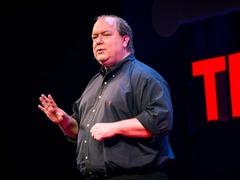Follow the links to watch the videos at the TED site.
8 TED Talks About Memory

Posted by: Kate Torgovnick
November 22, 2013
Peter Doolittle introduces us to working memory at TED University at TEDGlobal 2013. Photo: Bret Hartman
Experiences we have all had: walking into a room with a tremendous sense of purpose, only to realize that you have completely forgotten what the purpose was. Talking to someone in a restaurant and losing the thread of your conversation because you’re distracted by the juicier one at the table next door. Slowing down as you walk because you’re thinking about how to phrase a text message.

In today’s talk, educational psychologist Peter Doolittle shares how each of these phenomena is related to working memory, that thing which allows us to store and process our immediate experiences and mix them with long-term memories.
“Life comes at us, and it comes at us very quickly,” says Doolittle. “What we need to do is take the amorphous flow of experience and somehow extract meaning from it with a working memory that is about the size of a pea.”
Watch Doolittle’s talk for some helpful strategies for improving your working memory’s ability to hold on to information. And here, a few more TED Talks related to memory. Just make sure to actually store what’s said in them, m’kay?
___

Joshua Foer: Feats of memory anyone can do
Journalist Joshua Foer never thought he had a particularly good memory. So how did he win the U.S. Memory Championship? By working hard to master a centuries-old technique for remembering long lists: building a “memory palace” full of striking images, located sequentially in a space you know very well.
___

Steve Ramirez and Xu Liu: A mouse. A laser beam. A manipulated memory
In their lab at MIT, Steve Ramirez and Xu Liu planted a memory of fear in a mouse’s brain. Why, you ask, would they do this? In this unexpectedly hilarious talk at TEDxBoston, they share the big idea behind their work: that it may actually be possible to edit our memories. (Read the TED Blog post: 9 classic movies about memory manipulation, and how they inspire real neuroscience.)
___

Gabriel Barcia-Colombo: Capturing memories in video art
TED Fellow Gabriel Barcia-Colombo loves to collect things. In this short and fun talk from the TED Fellows pre-conference, he shows how he is collecting memories by creating video sculptures of his friends in jars. The point: to preserve his memories of these people for all time.
___
Elizabeth Loftus: The fiction of memory
You remember things exactly as they happened, right? Not necessarily. In this talk from TEDGlobal 2013, Elizabeth Loftus shares a body of work that shows how memories are susceptible to suggestion. This quote says it all: “Many people believe memory works like a recording device … This just isn’t true. Our memories are constructive. They’re reconstructive. Memory works a bit more like a Wikipedia page.” (Read more on Loftus’ work.)
___

Jeff Hawkins: How brain science will change computing
Jeff Hawkins, the creator of the Palm and the Treo, is taking unusual inspiration for new technology: the human brain. In this classic talk from TED2003, Hawkins shares what he’s learned from studying brains. Mainly, that they are complex memory storage systems that are highly adept at sorting and predicting what will happen next.
___

Daniel Kahneman: The riddle of experience vs. memory
What is happiness? Behavorial economist Daniel Kahneman shares how this is a complicated question, because we perceive things in two ways: as the “experiencing self” and as the “remembering self.” The experiencing self makes assessments in the moment, but the remembering self creates a coherent story in retrospect about them. Kahneman shares how powerful the remembering self is, helping us make decisions going forward and, ultimately, determining how satisfied we are with our lives.
___
Cesar Kuriyama: One second every day
Cesar Kuriyama has a cool idea for anyone who is concerned about remembering the little wonderful moments of their life. In this talk from TED2012, he introduces us to an app called One Second Every Day that allows you to record moments and stitch them together into a continuous video. Kuriyama plans to do this for the rest of his life, to make sure memories don’t just slip away.



No comments:
Post a Comment